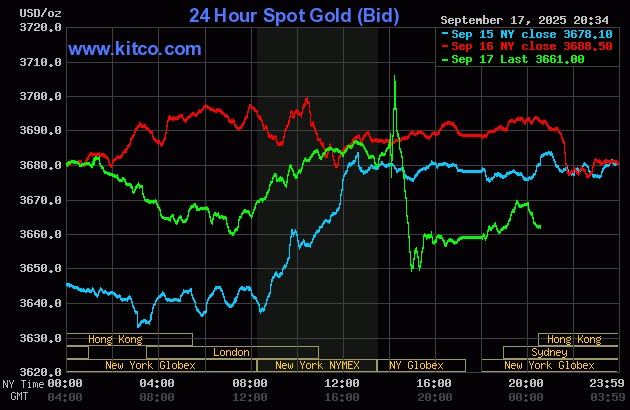Closing on 17/9, the spot price of gold dropped nearly 30 USD an ounce to 3,658 USD. The market initially rose to 3,707 USD after the US Federal Reserve (Fed) announced a 0.25% interest rate cut. However, the price later reversed course.
In a press conference following the policy meeting, Fed Chair Jerome Powell stated that the Fed would make interest rate decisions on a "meeting-by-meeting" basis.
According to Tai Wong, an independent precious metals investor, the Fed signaled uncertainty about future moves. “Jerome Powell called this a 'risk management' cut. This triggered profit-taking in the market," Wong said, but added that yesterday's move was a reasonable correction. Unless prices fall below the technical support level of 3,550 USD, the upward trend remains intact.
This is the Fed's first interest rate cut this year. Gold prices typically rise when interest rates fall, as the precious metal does not pay a fixed interest rate.
 |
Gold prices rose to a new record high, then fell sharply during the session on 17/9. Chart: Reuters |
Gold prices rose to a new record high, then fell sharply during the session on 17/9. Chart: Reuters
This year, gold prices have increased by 39%, largely driven by central bank purchases, demand for asset diversification away from the US dollar, safe-haven demand amid political and trade uncertainty, and a weaker USD. Deutsche Bank this week raised its average price forecast for next year from 3,700 USD to 4,000 USD.
US stock indexes saw mixed reactions. The Dow Jones Industrial Average (DJIA) rose 0.6%, while the S&P 500 and Nasdaq Composite fell 0.1% and 0.3%, respectively.
The Fed's move was largely anticipated by investors. “The market is less excited because it had hoped for the possibility of more aggressive easing from the Fed. Powell acknowledged a weakening labor market but said there was no need for sharp rate cuts as the situation is not yet serious," commented Michael Rosen, Chief Investment Officer at Angeles Investments.
The Fed’s upward revision of its inflation forecast also indicates the increasing challenges it faces. The agency must constantly balance the labor market and inflation when adjusting monetary policy.
Nvidia shares weighed on the market on 17/9. The stock dropped 2.6% following a report in the Financial Times that Chinese officials directed major technology companies to stop purchasing Nvidia’s RTX Pro 6000D chips.
Meanwhile, bank stocks rallied, boosting the DJIA. American Express shares climbed 2.7%.
Lyft shares rose 13.1% after news that Waymo, a subsidiary of Alphabet, would partner with the ride-hailing company to deploy a self-driving taxi service in Nashville next year. Conversely, shares of rival Uber fell 5%.
Ha Thu (according to Reuters, Kitco)












